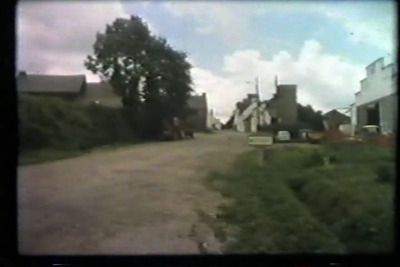
This film is so experimental, it doesn't even have a damn POSTER!
Too Early, Too Late
1981
Director: Daniele Huillet, Jean-Marie Straub
Starring: Countryside vistas and the essays of Marxist writers. No, I’m serious.
Y’know, as pretentious and posturing as I know I can sometimes get about film, I really really do not enjoy avant garde cinema. I just don’t get it. Dammit, I like it when my film tells me a story. And even if there’s a little bit of story mixed in with some experimentation, yeah, I like that too (Last Year at Marienbad, I’m looking at you). But just plain experimental? No plot, no actors? Oooh, then we have a problem.
Too Early, Too Late is exactly that type of a film. The entire film – the ENTIRE film – is very long shots of various countryscapes throughout the world. The narration over these long pastoral shots is readings from famous Marxist essays read in the most possible flat voices you have ever heard in your entire life. The first part of the film is a reading of a letter by Friedrich Engels listing stats of numbers of impoverished people in the French countryside, read over shots of the French countryside. The second part of the film is a similar structure, but now in Egypt, reading an essay by Mahmoud Hussein, describing how the Egyptian people should cast off their European rule to be independent.
Let’s talk average shot length. Cut to my punch line: it’s really really really long. For reference point, the average shot length in an average “classic” Hollywood movie (re: 1930s-1950s) is about 8-10 seconds, maybe a little longer. Starting in the 1960s, that number started plummeting. The average shot length in a Michael Bay film is probably only 1-2 seconds.
I watched a shot of an Egyptian street in Too Early, Too Late that was eleven minutes. Eleven minutes of static shot, no movement, no narration. You know how I know it was eleven minutes long? I timed it. Because what the hell else was I going to do during it? The average shot length in the French section of the film seems to be on the order of 45 seconds or so, well above anything you’ll see in a typical narrative film. The second Egyptian section scoffs at 45 seconds and raises the bar, having several shots on the order of minutes long. I mean, it makes the final shot of The Third Man seem like something out of Transformers.
Dear lord, it’s dull.
Despite how damn tedious Too Early, Too Late is, I have to begrudgingly admit that the movie got me thinking. In between trying to keep track of average shot lengths and checking my email, I started pondering the different shots I was being shown. All the shots of France looked more or less the same. Ditto for Egypt. More remarkably, when viewed from a distance, the landscapes we see from Egypt are not so terribly different from those we see in France. The countryside is the countryside, no matter where you are. Trees are still trees, a river is still a river. This matches well with the idea behind the narration; the plight of the impoverished peoples in France in years gone by is not so different from the plight of impoverished people in Egypt. We are all interconnected, we are all living in the same place, fighting the same powers. Perhaps I manufactured that message from the film; perhaps it is not the filmmakers’ intent, not in the slightest, but I got to a point where I was desperately looking for some sort of theme, and that is what I latched on to.
Given the current turmoil and political uprising in Egypt, there is certainly a bit of “history repeating itself” in this film. To that end, politically, there is certainly a bit of significance to the essays that are read. The essay in 1001 Movies You Must See Before You Die for this film lists it as being an amazing landscape film. Well, when you have a ten minute shot of traveling down an Egyptian road, I can’t really argue with that. The landscapes are very nice.
But is Too Early, Too Late compelling cinema?
Hell no.
Bottom line: this is a very dull film. I really can’t think of a reason that anyone would choose to watch this on their own. I watched it because it’s in my film book. Others probably watch it because it’s assigned to them in a film class. I really can’t picture someone sitting down on a Friday night and voluntarily picking this film to throw on.
Of course, now that I’ve said that, I’m sure I’ll meet that person.
Arbitrary Rating: 3/10
Sounds like the only reason to watch it is because it's in the book. And it's probably only in the book because it's both difficult to find and difficult to watch. Talk about an infinite loop.
ReplyDeleteUm... yeah. I would probably agree with that. I mean, dude, I'm really grateful to you for providing those links so I *could* see it (and check it off the list), but holy mackerel, this is such a nothing of a film.
DeleteCould someone please, please tell me where I can find this movie?
ReplyDeleteget more best replica designer explanation replica designer bags wholesale why not find out more designer replica luggage
ReplyDelete